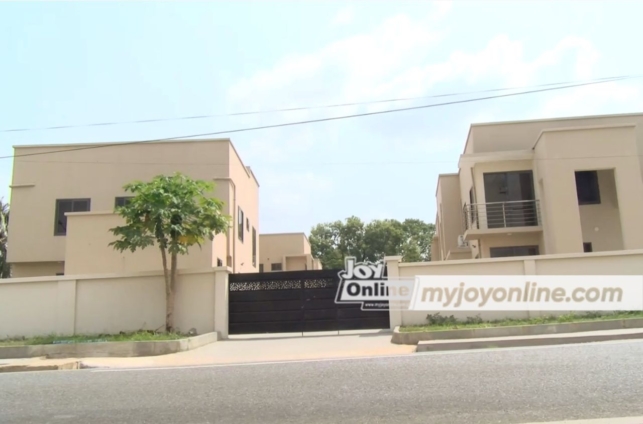
JoyNews has discovered that the residence of the late Supreme Court Justice Marful-Sau remains unoccupied.
A statement from the Ministry of Works and Housing has refuted allegations of collusion with former Chief Justice Anim Yeboah to sell the lands.
Instead, the government asserted that it is implementing a redevelopment programme for prime government lands, following a policy dating back to 1992.
Redevelopment of state lands: JoyNews checks show residence of late Supreme Court Justice Marful -Sau remains inhabitable. #JoyNews pic.twitter.com/P6w8RFYION
— JoyNews (@JoyNewsOnTV) January 15, 2024
JoyNews‘ Blessed Sogah visited the redeveloped property, which, upon completion, will serve as a residential facility for ministers of state, workers of the judicial service, and other government officials.
An Assembly member at Roman Ridge, Adam Yussif walked the news team through the buildings explaining that “this particular property here is like an acre of land which used to house about one property, one tenant, and that tenant was a prison officer.”
“And then now, as you can see, we have about six units of property here, which can house about three directors from the same unit or from a different government unit, and which is laudable because the land size of this area over the years was like an acre but (we had) a single house, a very small, tiny house in the building. Now, if it’s redeveloped, I mean, you can take more people, unlike other places,” he said.

According to a statement released by the Lands and Natural Resources Ministry, the current developments taking place at the official residence of the late Justice Marful-Sau forms part of the Government Redevelopment Programme (GRP).
“The GRP, which dates as far back as 1992, has since its inception, been widely implemented by successive Governments within the Greater Accra Region, specifically in Kanda, Cantonments, West Ridge and Roman Ridge. On 14th May 2018, Cabinet approved a revised scheme regarding the GRP to include other neighborhoods such as Osu Ringway, Airport Residential Area and Labone,” the statement noted.
It added that, the GRP was necessitated by the need to find residential accommodation in Accra for the ever-growing number of public and civil servants.
The programme is underpinned by the philosophy to optimise the government’s prime lands located within old run-down neighborhoods of Accra and other major cities in the country.
The objectives of the Programme are to, among others:
- Achieve higher and optimum densities in prime areas and ensure efficient utilization of existing infrastructure.
- Contribute to the positive impact of the growth of our major cities by mitigating the rapid horizontal sprawl.
- Achieve a significant increase in the total stock of both government and private residential properties countrywide.
- Improve the urban context and neighbourhood characteristics of the old residential properties in our major cities.


